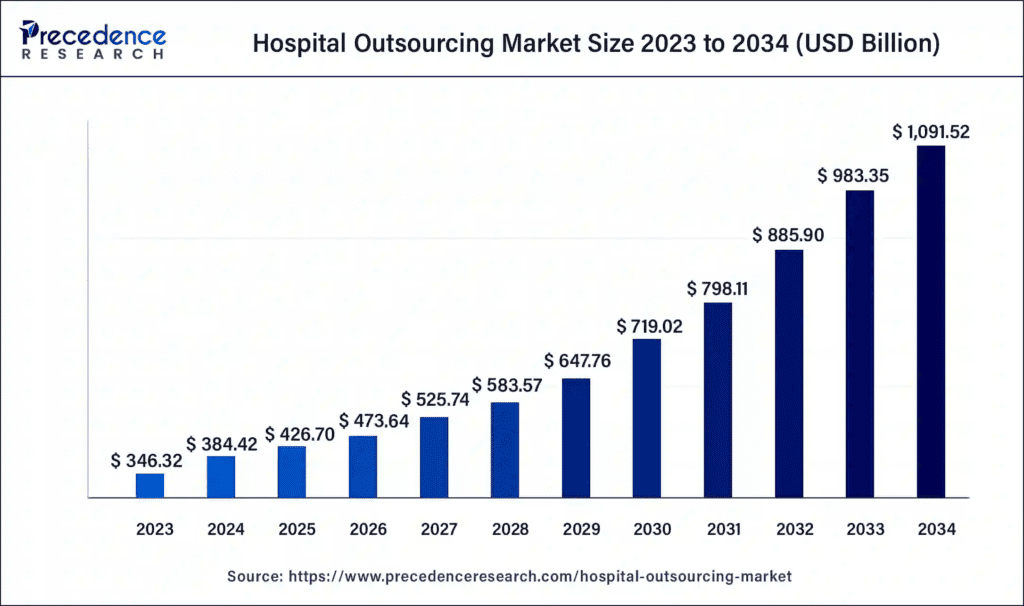Healthcare Outsourcing Services: Key Statistics You Need to Know
08 Nov 2023 By: Michael Kansky
Updated
Healthcare outsourcing services are growing because they help providers lower costs, fill staffing gaps, and speed up administrative work like billing, coding, and claims. Many organizations see savings of up to 30% by using specialized partners instead of building large in-house teams. For example, outsourcing claims processing can reduce errors and get reimbursements faster, while letting clinicians focus more on patient care.

What is Healthcare Outsourcing?
Healthcare outsourcing lets organizations hand off jobs like medical coding and billing to outside pros. This way, they can pay more attention to caring for patients, boosting their efficiency.
Selecting the right healthcare outsourcing provider is important. Look for their expertise and history. Good communication with the provider ensures smooth operations and success.
What are the Benefits of Healthcare Outsourcing Services?
Healthcare outsourcing can reduce operational costs by up to 30%.This saving comes from scale economies and the expertise of specialized providers.
Outsourcing in healthcare does more than save money. It connects you with experts who understand healthcare inside out, guaranteeing tasks are completed both correctly and swiftly.
Outsourcing helps make patients happier by speeding up and smoothing out services, creating a better experience for everyone.
What is the Impact of Healthcare Outsourcing on Cost Savings?
Outsourcing helps healthcare places save money by skipping the costs of hiring and training for jobs like medical coding. This reduces expenses on staff and infrastructure.
Outsourcing connects healthcare organizations with expert tech and know-how, avoiding the expense of building these resources themselves and boosting efficiency. It also lets healthcare groups adjust their services easily without huge spending on staff or infrastructure.
Healthcare outsourcing comes with challenges such as keeping data safe, protecting privacy, and overcoming language differences to ensure teamwork flows well.
What are the different types of Healthcare Process Outsourcing?
Healthcare process outsourcing helps organizations focus on patient care by delegating non-core tasks. Common types include medical coding, billing, claims processing, and data management. These services cut costs, improve efficiency, and streamline operations.
Healthcare Coding and Financial Management
Medical business process outsourcing ensures compliance in coding, while financial experts manage billing and revenue cycles. This reduces the burden on in-house teams.
Claims Management and Processing
Outsourcing claims processing speeds up reimbursements and reduces errors. It ensures smooth claim submissions, verifications, and follow-ups.
Data Input Services in Healthcare
Data entry outsourcing reduces errors and manages large information volumes. It frees internal resources for essential tasks.
Medical Record Transcription
Medical transcription converts audio recordings to written records. Outsourcing ensures accuracy, privacy compliance, and lessens staff workload.
Receivables Management
Outsourcing receivables management improves cash flow and reduces unpaid balances, allowing healthcare providers to focus on care.
The Numbers Behind Healthcare Outsourcing
Let’s explore important healthcare outsourcing stats. They shed light on the industry’s status and future growth.
Key Statistics on Healthcare Outsourcing Services
Grand View Research found the global healthcare outsourcing services market valued at $170.84 billion in 2020, with a predicted growth of 10.6% annually from 2021 to 2028. This growth stems from the increasing demand for cost-effective healthcare and shortages in skilled workers.
The report also shows the Asia Pacific as the top region for healthcare outsourcing growth, with an 11.3% CAGR. Cost-effective labor and outsourcing hubs in India and the Philippines drive this. Their strong infrastructure, supportive policies, and skilled professionals make them key players.
The report indicates the pharmaceutical segment dominates medical outsourcing. Its complexity, covering R&D, clinical trials, compliance, and manufacturing, drives this. Outsourcing lets firms concentrate on core tasks, leveraging specialized skills and saving costs.
Trends in General Outsourcing
Outsourcing is growing fast and will reach $885.1 billion by 2028. Tech like AI and cloud computing makes it easier by streamlining processes and cutting costs.
Cost savings are key. Outsourcing reduces the need for in-house resources and provides specialized skills. Companies now focus on long-term partnerships, not just single tasks.
Healthcare outsourcing services is booming due to labor shortages and lower costs. These trends help companies hit their goals and improve performance.

Here’s a survey showing how outsourcing helps the healthcare industry
Black Book’s survey anticipates a surge in healthcare outsourcing due to factors like expertise shortages and cost-efficient technology adoption. Hospitals, large and small, are increasingly outsourcing nonclinical services to address financial constraints. Innovations like remote patient monitoring are reshaping clinical function outsourcing. Improved service quality and returns on investment are driving strategic planning efforts to leverage third-party vendors for cost efficiency. Amid financial challenges, outsourcing promises significant cost savings, allowing providers to prioritize patient care and technology implementation.
Driving Forces Behind Healthcare Outsourcing Growth
Key drivers are boosting healthcare outsourcing growth. They’re changing the industry, giving healthcare companies lots of opportunities to improve how they work.
Addressing Talent Shortages in the Healthcare Industry
Healthcare outsourcing is growing fast because we’re really short on healthcare staff. As the need for care keeps rising, we simply don’t have enough pros to go around.
Having outside healthcare outsourcing companies take care of things like medical coding and transcription helps lessen the pressure from not having enough staff around. Specialized providers can ensure these critical admin tasks are done accurately and on time.
Tapping into AI for Smarter Healthcare Outsourcing
AI integration also takes part in the growth of outsourcing. It can automate tasks and boost efficiency in healthcare processes.
Healthcare firms are outsourcing AI solutions for medical image analysis, data processing, and analytics. AI cuts manual labor costs and speeds up key processes with improved accuracy.
The Rise of Telehealth Support in Outsourcing
Telehealth became much more popular because of COVID-19. Now, providers count on outside help for telehealth as they adjust to the new way of doing things.
Outsourcing telehealth means healthcare teams can provide virtual check-ups and watch over patients remotely without spending a lot on tech. This improves service access and saves money.

What Essential Steps Should You Take to Begin Healthcare Process Outsourcing Successfully?
To start outsourcing, first identify tasks that drain internal resources but can be handled externally. Align these tasks with your goals, then evaluate outsourcing partners for expertise. Set clear expectations, define KPIs, and keep communication open for a smooth process.
Current Trends in the Healthcare Outsourcing Market
Staying on top of trends matter. They offer sneak peeks into the market’s future, helping healthcare businesses make savvy decisions.
Innovations Shaping the Future of Healthcare Outsourcing
Moving to such new technology as cloud computing, robotic process automation and blockchains is a big step. These innovations are changing the industry.
Embracing new ideas helps healthcare companies work smarter, protect patient information better, and improve how they care for people. Outsourcing providers leading in tech offer advanced solutions for evolving healthcare needs.
Adapting to Changing Patient Needs in Outsourced Healthcare Services
The healthcare scene and patient needs keep changing. Outsourcing providers must adjust and offer tailored medical services outsourcing.
Personalized care and patient-focused approaches are crucial. Healthcare organizations should work with outsourcing firms that value these, meeting and surpassing patient needs.
How Do You Choose the Right Healthcare BPO Partner for Your Organization’s Needs?
Choosing the right BPO partner means assessing their healthcare experience and regulatory compliance. Check their expertise in services like billing, coding, or claims management. Review their tech capabilities, data security, and communication processes to ensure smooth collaboration.
In Conclusion
Healthcare groups are using outsourcing more to work better and save money. This smart step can save cash, make patients happier, and offer expert help.
As healthcare evolves, the demand for efficient patient services grows. HelpSquad’s Healthcare BPO offers virtual assistants and 24/7 customer service to enhance your operations. Our skilled bilingual agents, starting at just $8/hour, handle back-office tasks, customer support, and research. Stay ahead in patient care with HelpSquad. Talk to us today and see the difference outsourcing can make.


